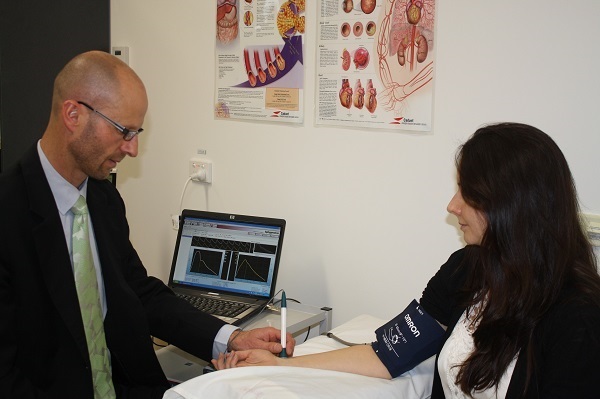New evidence for a better way to measure blood pressure

New evidence for a better way to measure blood pressure
A world-first study by UTAS' Menzies Research Institute Tasmania has discovered that a new method for assessing blood pressure can significantly improve the quality of care in people with high blood pressure.
A world-first study by UTAS' Menzies Research Institute Tasmania has discovered that a new method for assessing blood pressure can significantly improve the quality of care in people with high blood pressure. The study was published online this week in the prestigious blood pressure journal by the American Heart Association, Hypertension.
High blood pressure (hypertension) affects around 30 per cent of Australian adults. It is one of the most common causes of cardiovascular disease which kills more Australians than any other disease.
Tasmania currently has the highest prevalence of high blood pressure in Australia.
The study used a new method to measure central blood pressure, instead of upper arm blood pressure, which is commonly used by doctors.
Associate Professor James Sharman said that central blood pressure is considered to be a more accurate indicator of the pressure the heart and other vital organs experience.
"This is the first time central blood pressure has been used to guide decisions on blood pressure treatment."
"The main finding was that significantly less medication was needed to achieve healthy blood pressure levels when treatment decisions were based on central blood pressure.
"Sixteen per cent of the participants came off medication altogether.
"These are important findings because people taking these medications can experience unwanted side effects that impact on quality of life, but these adverse effects are less likely with lower doses."
"We are very excited by the results which provide the framework for a better way to care for people with high blood pressure," Associate Professor Sharman said.
Mrs Erika Wedd, from Hobart, has suffered from high blood pressure for several years. Before participating in the trial she was taking a high dose of medication to treat blood pressure but was experiencing unwanted side effects.
"I was on a high dose of drug and wasn't feeling well, but I'm much better now that I'm on the lower dose and my blood pressure is good," Erika said.
"I'm very happy with the result and so is my doctor," she said.
Funding bodies that support our BP research include the National
Health and Medical Research Council of Australia, UTAS and AtCor
Medical Pty Ltd.
Information released by:
Fiona Horwood, Communications Manager
Phone: 03 6226 7751 Mobile: 0409 357 384
email: fiona.horwood@utas.edu.au
Contact:
Phone:
Email: